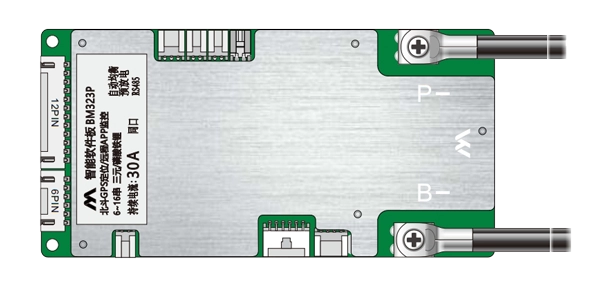The BMS protection board is an vital component for ensuring the efficiency and longevity of battery systems.Mingtang tells its primary functions,key components and benefits.
Learn more
In recent years, the rapid growth of industries relying on renewable energy, electric vehicles (EVs), and large-scale battery storage systems has highlighted the need for sophisticated, efficient, and scalable battery management systems (BMS). The evolution of Cloud BMS has played a critical role in enabling these sectors to optimize battery performance, enhance safety, and improve the overall efficiency of battery-powered systems. This article Mingtang will explore the key features of Cloud BMS across various industries.

A Cloud BMS (Battery Management System) is an advanced software and hardware solution designed to monitor, manage, and optimize the performance of batteries in various applications. Unlike traditional BMS that typically operate locally or on-site, Cloud BMS utilizes cloud computing technology to provide remote monitoring, data analytics, and real-time control. By integrating cloud-based technologies, Cloud BMS allows for continuous tracking of battery health, performance, and operational efficiency, all while enabling centralized control and management.
At the core of a Cloud BMS is the ability to collect and analyze large amounts of data from batteries in real-time. This data is then transmitted to a cloud-based platform where it can be accessed remotely via the internet, allowing operators, engineers, or fleet managers to monitor and optimize battery performance from anywhere.
One of the most significant advantages of Cloud BMS is the ability to collect data in real-time from multiple battery systems. The system continuously monitors essential battery parameters, including voltage, current, temperature, state of charge (SOC), and state of health (SOH). This data is transmitted to a cloud-based platform, enabling operators to keep a close eye on battery health and performance from remote locations.
For example, fleet operators can monitor the charge levels and health of batteries in their electric vehicles (EVs) without the need to physically inspect each vehicle. This capability saves time and ensures that any potential issues are identified early, preventing costly downtime.
Cloud BMS systems leverage advanced data analytics and machine learning algorithms to predict potential failures or degradation in battery performance. By continuously analyzing historical data and detecting trends, the system can identify early signs of battery failure, overcharging, or overheating. This predictive capability helps reduce the risk of battery failure, thereby extending the battery's lifespan and reducing the need for costly replacements.
For instance, if the system detects abnormal temperature fluctuations or irregular voltage drops, it can send real-time alerts to the operator, allowing them to take corrective actions before a failure occurs. This proactive approach is crucial for industries such as electric vehicles (EVs) and renewable energy storage, where battery failure can result in significant downtime and financial losses.
With Cloud BMS, users can remotely control and manage battery operations. This feature is particularly useful in large-scale applications, such as renewable energy storage or electric vehicle fleets, where operators need to ensure the optimal performance of numerous batteries spread across different locations. Remote management allows operators to adjust settings, perform diagnostics, and optimize battery performance without having to be physically present.
For example, in a solar energy storage system, a Cloud BMS can remotely balance the load between batteries, adjust charging cycles based on solar power availability, and ensure the batteries are operating within safe temperature and voltage ranges. This level of control significantly improves operational efficiency and reduces the need for on-site maintenance.
Battery safety is one of the most critical concerns in industries that rely on large-scale battery storage or electric vehicles. A Cloud BMS ensures enhanced safety by constantly monitoring the health and status of the batteries and their individual cells. In the event of any abnormality, such as overcharging, deep discharging, or overheating, the system can trigger automatic shutdowns or take corrective actions to prevent damage or safety hazards.
By integrating safety features such as thermal management, voltage balancing, and overcharge protection, Cloud BMS enhances the overall safety of battery-powered systems. This is especially crucial in industries like electric vehicles and uninterruptible power supplies (UPS), where battery safety is paramount.
Another key benefit of Cloud BMS is its scalability and flexibility. Whether managing a small fleet of electric vehicles or large-scale battery storage systems, Cloud BMS can be easily scaled to accommodate growing energy needs. Cloud-based systems provide a level of flexibility that traditional BMS solutions simply cannot match, allowing users to monitor and manage battery systems of varying sizes from a single, centralized platform.
The scalability of Cloud BMS makes it ideal for use in a wide range of industries, including renewable energy, electric vehicles, telecommunications, and industrial applications. As the demand for battery storage and electric vehicles continues to rise, the ability to scale a Cloud BMS will be critical for managing these increasingly complex systems.
The Cloud BMS is a revolutionary tool that enables users to efficiently manage and optimize the performance of battery systems across various industries. By providing real-time monitoring, predictive analytics, remote control, and enhanced safety features, Cloud BMS is helping to transform how batteries are managed in everything from electric vehicles to renewable energy storage systems. As the world continues to shift towards more sustainable energy solutions, Cloud BMS will play a critical role in ensuring that battery systems operate efficiently, safely, and cost-effectively.
With its scalability, data-driven insights, and ability to predict potential failures, Cloud BMS is an essential tool for businesses and industries looking to optimize their battery management processes and improve the performance and longevity of their battery systems. Whether you're managing electric vehicle fleets or large-scale renewable energy storage systems, Cloud BMS offers a robust and intelligent solution to meet the growing demands of modern energy storage and battery-powered systems.